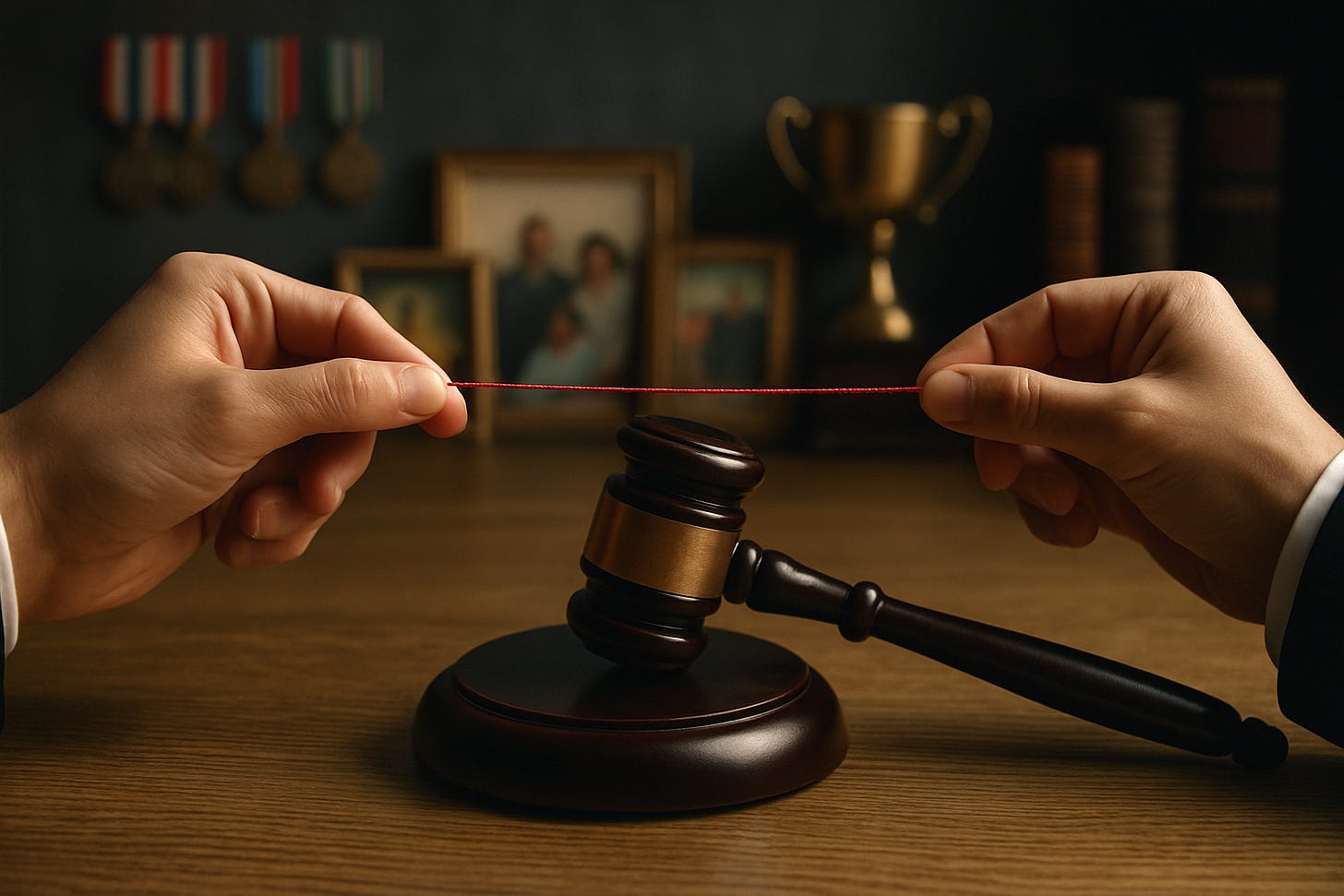We Are Revealed by Who We Excuse
Integrity, silence, and the accountability we owe – especially to those we admire
This is the first essay in the newly expanded and retitled BRIDGE publication—born from The Sunday Essay and LIFT: The Physics of Leadership, and now reimagined as a space for something larger, more urgent, and more useful.
The real gap isn’t just between what each of us says and what we deliver. It’s between what we intend, what we believe we’re capable of, and what we’re actually capable of becoming.
In every life, every role, every season, there’s a chasm between the now and what could be. Between identity and possibility. Between the present and your potential.
BRIDGE is here to help you cross that gap.
It’s both a mindset and a method – a lens to turn vision into visible results.
This publication offers a way to see clearly, act wisely, and lead with courage. Through story, tools, and lived reflection, we’ll explore how to move from insight to action—and how to do it with integrity, clarity, and human decency intact.
Thank you for being here. Let’s begin.
There’s a difference between justice and judgment.
Justice asks: What must we do, even when it’s uncomfortable?
Judgment asks: How do we protect what we already believe?
I thought about that difference recently, during a quiet drive with my son. We had been talking about something else entirely – job prospects, old friends, weekend – but then the radio shifted to the day’s news, and in that strange way conversations change lanes, the subject turned to a well-known figure walking free after months of legal and public scrutiny. A leader, once lionized, now carefully escaping consequence.
The car filled with that particular kind of silence that follows public disappointment – too tired for outrage, too familiar for surprise. And after a while, my son, nearly grown now, looked out the window and asked without turning his head:
“Did you ever stay quiet when you knew something wasn’t right?”
It wasn’t a trap. He wasn’t accusing me of anything. But his voice was steady in a way that told me the question had been building – not just about me, but about the world.
I didn’t answer right away. I wanted to tell the truth.
Because the truth is yes. And also, no. And everything in between.
And as I sat behind the wheel, I realized something: the hardest part of that question isn’t the answer. It’s the awareness that someone who loves you is trying to understand whether your principles are practiced or merely stated.
We raise our children to speak up. But we don’t always tell them how hard it is to keep doing it once there’s a title on your door, a system at your back, and people you admire on the other side of the truth.
There was a moment like that years ago – one of those glass-walled boardrooms where the stakes are quiet but enormous. I wasn’t an employee in that room, but I was close enough to the architecture of the decision-making to feel responsible. The meeting had moved past the formal agenda. We were in that unstructured zone near the end, where conversation drifts from bullet points to broader impressions, where people speak more freely, sometimes more carelessly.
A senior executive made a comment – dismissive, subtle, inappropriate in that slippery way that leaves room for plausible deniability. It wasn’t loud. It wasn’t outrageous. It was the kind of thing that gets said with just enough ambiguity to make challenging it feel impolite.
I remember the way the room went still - not because anyone was shocked, but because everyone understood, in an instant, that no one would say anything.
No one wanted to make it a bigger moment than it already was. No one wanted to seem overreactive. So we moved on. The slides came back up. The room recovered its professional posture.
And I stayed quiet.
It wasn’t my company. But it was my presence in that moment. And that silence became mine to carry.
Later that night, back in my hotel room, I kept replaying the moment. Not the comment itself, but my own stillness. I had been a guest in that space. But the question followed me home: If you won’t say something when you’re not the most vulnerable person in the room, then when will you?
That moment shifted something in me. I noticed that I started speaking up more often. Not angrily. Not performatively. Just clearly. The discomfort never went away, but it stopped being the reason I stayed quiet.
I keep seeing replays of that moment – in boardrooms, in senior leadership offsites, in risk committee meetings, in whispered sidebars that follow hard truths no one wants to surface. And with each one, I find myself more anchored. I speak now with compassion, with tact, and with genuine respect for the room. But I speak. I do my best to protect the vulnerable – especially when they are not in the room to protect themselves.
We don’t build trust by being perfect.
We build it by not pretending we didn’t hear what we heard.
I’ve also seen the opposite.
A few years later, I worked closely with a CEO who found herself in a different kind of storm. Her team had missed a regulatory disclosure window. It wasn’t criminal, but it was sloppy, and it cast doubt. She wasn’t directly responsible – she hadn’t even seen the requirement before it was late. But when the board began looking for someone to blame, she did something few leaders have the steadiness to do.
She stepped in front of it.
She stood up in a room full of people who wanted someone junior, someone disposable, and she said: “This happened on my watch. I lead the system. The system failed. That’s mine to own.”
The room froze. A few people tried to dissuade her. She stayed grounded. She didn’t raise her voice. She didn’t dramatize. She walked the board through the fix, laid out the timeline, invited scrutiny, and didn’t deflect.
What struck me wasn’t just the accountability – it was the absence of self-protection. She wasn’t trying to get credit for being noble. She just believed that accountability didn’t weaken her authority – it clarified ownership and who was in charge.
People followed her more fiercely after that – not because she refused to punish someone, but because she didn’t outsource responsibility. Her action reminded me that integrity isn’t loud - but it’s instantly recognizable.
And here’s the part that still frustrates me: there is overwhelming evidence that this kind of leadership works. Brands bounce back faster. Customers trust more. Teams perform better. Investors stay longer. There’s data. There are case studies. There are decades of leadership research. And yet, most leaders still default to denial, spin, or silence. Is it fear? Is it poor modeling? Or is it a reflection of the boards, coaches, and advisors who surround them and silently allow it?
We must reflect – individually and collectively – on the signals we reward.
Not every story ends this way.
A close friend of mine, someone I had mentored early in his career, found himself in a far less forgiving situation. He had joined a legacy company in a senior transformation role – one of those positions where your task is to rebuild trust and systems at the same time.
He uncovered financial irregularities. Not a smoking gun, but enough to warrant concern. He raised it internally, respectfully. Documented it. Suggested corrections. Urged better process.
The result? He was gradually sidelined, his credibility questioned, and then one day summarily pushed out.
His dismissal was not immediate. It started with exclusion. Reduced responsibilities. Fewer meetings. The kind of slow, strategic sidelining that companies use when they want someone gone but need clean hands.
He walked out with his values intact, but not without cost.
We met for coffee a few months later. He looked calm but older – not in years, but in wear. We talked about his new role, a healthier place. And then, toward the end, he asked quietly:
“I did the right thing. But was it worth it?”
I didn’t answer right away. Because I knew what he meant.
Doing the right thing doesn’t always feel like a win. Especially when you do it early – before the headlines, before the whistleblowers, before the market catches up to your conscience.
Sometimes you do the right thing, and all you’re left with is the right thing.
And even that, in the wrong moment, can feel lonely.
A nation is measured by how it treats its most vulnerable.
But it is revealed – entirely and unavoidably – by how it holds accountable the people it once placed on pedestals.
And that’s true in families, companies, communities, and courts. In startup teams and investment committees. In boardrooms and war rooms and WhatsApp chats. In every place where power has been entrusted.
The whole of our shared life depends on whether we believe that power is a privilege we lend – or a force we fear.
We live within the fabric spun from the events in our lives – those we shape, and those that happen to us. And that fabric frays when accountability is treated as a threat, not a thread.
Too much of the world now treats integrity as an outdated weakness – or worse, pretends to honor it while dismantling every guardrail that protects it.
Because when accountability only applies to the powerless, it is not justice. It is performance.
When we excuse the familiar and punish the unfamiliar, we’re not protecting culture – we’re practicing favoritism.
And when we explain away wrongs because the person in question “means well” or “always delivers results”, we’re not upholding excellence. We’re outsourcing character.
I answered my son eventually.
I told him yes. I have stayed silent when I shouldn’t have. And I’ve spoken up when it mattered. And I’ve lived long enough to know that both leave a mark.
He nodded. That was all.
We kept driving.
And in that quiet, I wondered what he would one day say about me – what the people I’ve led, coached, advised, and mentored, say when I’m no longer in the room.
I hope they say:
He tells the truth. Even when it cost him.
He protects the people who cannot always protect themselves.
He tries to do the right thing. With presence. With care. With conviction.
I hope they’ll say that.
Even if I haven’t always lived up to it.
Because I am still working on it.
And we all should be.
Enjoy your loved ones and the rest of your Sunday
And thank you for spending some of it with me – especially here, at the start of this new chapter.
BRIDGE will always be free to read, and I’d be honored if you shared it with someone who might benefit.
Your thoughts shape this work.
If something resonated – or raised a question – I’d love to hear from you.
Warm regards,
Adi





